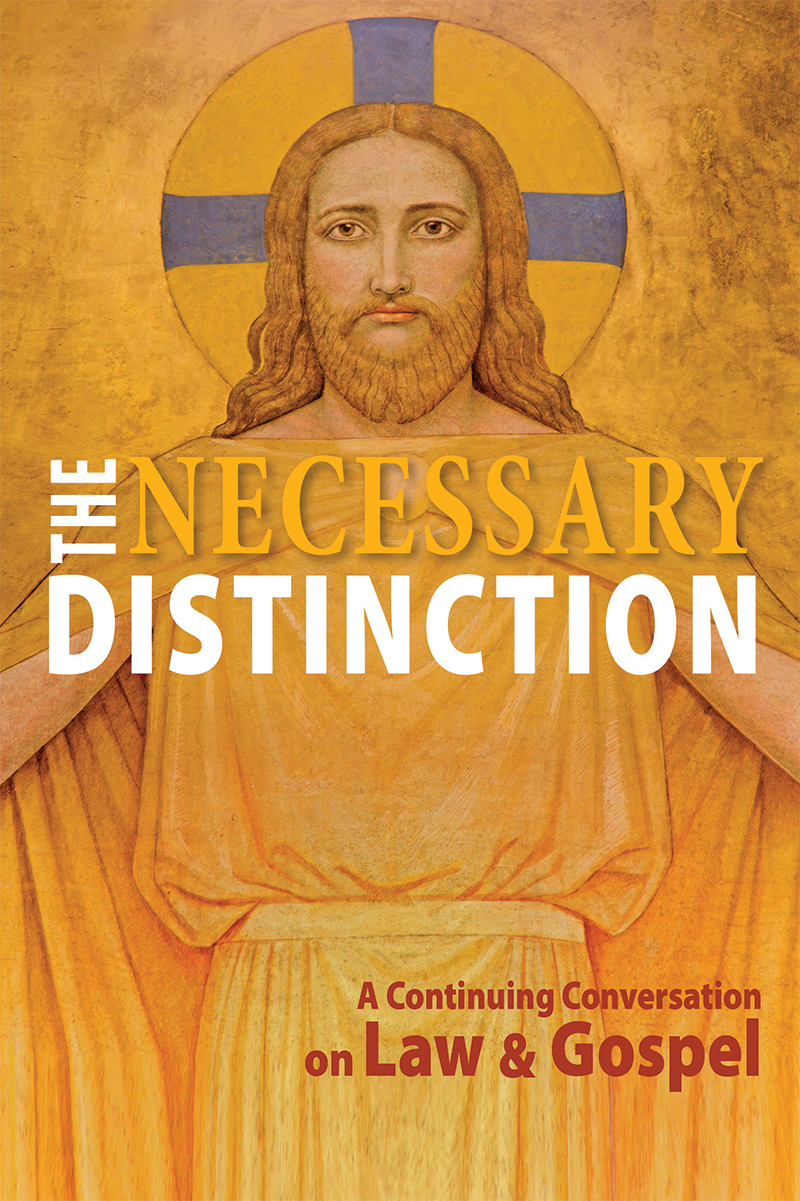The Necessary Distinction: A Continuing Conversation on Law and Gospel. Edited by Albert B. Colver III, James Arne Nestingen, and John T. Pless. St. Louis: Concordia Publishing House, 2017. Click Here.
Most pastors are bibliophiles but also busy and so can appreciate the clever (if a bit macabre) Internet meme that says, “I’ll probably die next to a stack of books I was meaning to read.” Don’t let this book stay on that stack. As the fruit of “ongoing discussions” (p. 9) among pastors and theologians from three Lutheran church bodies, The Necessary Distinction means to be the first course of its subtitle: a continuing conversation.
And what a delicious conversation. The prose is often sparkling and witty and always engaging and erudite. Books of theological essays by different authors are sometimes like music albums before the age of iTunes: one or two big hits while the rest of the content is mostly bland stuff meant to merely take up space. Every essay in The Necessary Distinction is on point and worth the reader’s time.
The book begins with an LCMS perspective on Law and Gospel—from Walther’s evening lectures for seminary students to recent publications and controversies—and then moves to an overview of the distinction of Law and Gospel. Mark Seifrid’s general summation of the topic belongs right where it is, at the start of the book. It is an excellent and succinct introduction and will make a great resource for adult catechesis. At a recent theological seminar on preaching, the topic of pastors teaching (or neglecting to teach) laypeople how to listen to sermons was discussed. Seifrid’s little essay on the distinction of Law and Gospel is the perfect tool for such an ear-training task.
The next few essays are examples of a metaphor a dear professor and mentor regularly used to describe good practical theology: “Practical theology,” he said, “is just systematics, exegesis, and historical theology wearing out a pair of cowboy boots in the parish.” The authors ask and answer how Law and Gospel do their killing and resurrecting work in the liturgy, in pastoral care, in the Christian Life, and in the pastor’s calling. “It is no exaggeration to say that the proper distinction between Law and Gospel is the native air in which Lutheran pastors live, move, and have their being” (p. 109). What does it look like when Law and Gospel wear out boots at the altar, walking down the corridor of the oncology ward, on visits to the homes and workplaces of parishioners? “This vocation is crucial and not to be compromised—it delivers in specific and concrete ways God’s actually dealing with sinners” (p. 133).
After an excellent overview of Luther’s Lectures on Galatians, much of the rest of the book deals with controversies old and new surrounding the distinction of Law and Gospel—with two essays dedicated specifically to the third use of the Law. The most vivid and arresting of all the essays is Steven Paulson’s: “A Royal Ass” (even the title gets one’s attention). Paulson’s wordsmithery approaches wizardry and delights as it guides the reader on a tour of Luther’s jocular schooling of Erasmus on Psalm 73, “free will,” and Law and Gospel. A taste:
But the real question is not whether you are in fact an ass or not but precisely what kind of ass, since there is not one species, but two. Which kind of ass you are makes all the difference in the world . . . To be very precise, we learn that we are two asses at once, which is called the simul. But before anyone attempts to investigate himself to find evidence of the kind of ass he is, he must learn to look away from himself to the external matter of lordship. The kind of ass you are depends not upon any choice you ever have made or ever will make, and requires no “consent” of a “free” will, but depends entirely on who is your lord, who is precisely the one who rides you. You are an ass ridden by your Lord (p. 268).
In 2017, five-hundred years after the beginning of the Reformation, theological debates are no longer initiated by inky paper nailed to church doors. Now the theological jousting and chatter largely occur on the Internet—with all it’s blessings and curses. Too much of the “light” emitted therein is from the burning of straw men. In such a dispiriting atmosphere, The Necessary Distinction is so very welcome.
This volume offers a wealth of thoroughly researched, well-crafted reflections that shine edifying light on the distinction between Law and Gospel. Take up, and read.
The Rev. Karl Hollibaugh
St. James Lutheran
Gonzales, Louisiana

